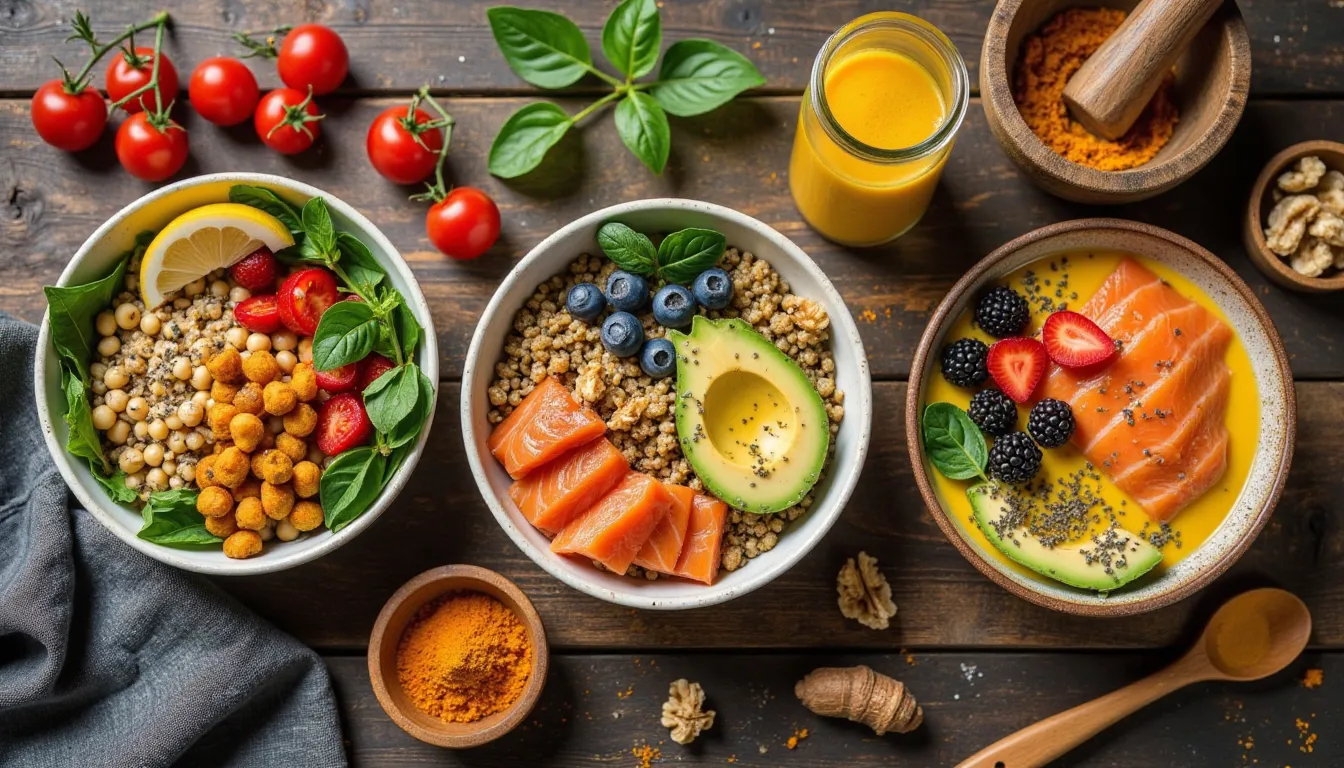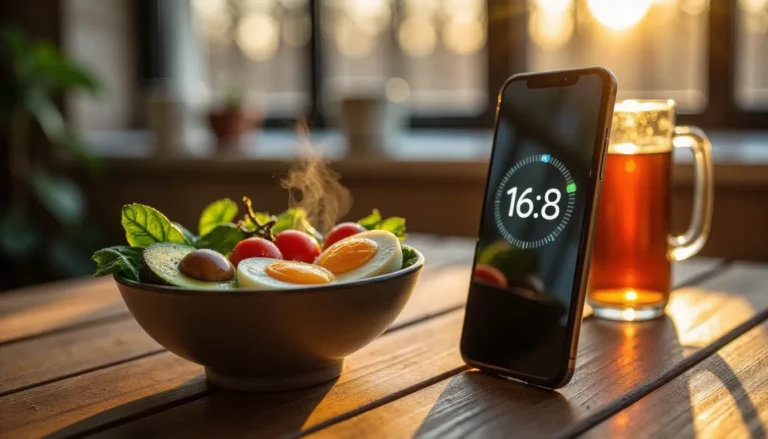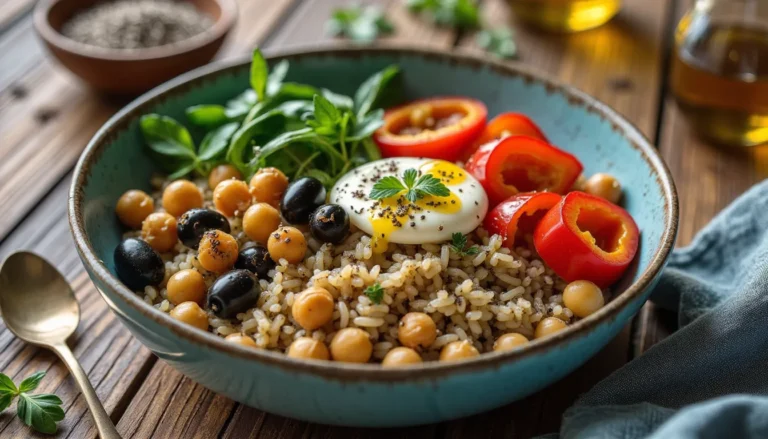Want to fight inflammation with your diet? Your lunch choices can make a big difference in how you feel. These anti-inflammatory lunch ideas taste great and help reduce inflammation in your body.
What Makes a Lunch Anti-Inflammatory?
An anti-inflammatory lunch contains foods rich in antioxidants, healthy fats, and fiber. It limits processed foods, refined carbs, and added sugars. Eating this way helps manage chronic inflammation, which is linked to heart disease, diabetes, and arthritis.
“What we eat directly affects inflammation in the body. The right lunch choices can help control inflammation and give you energy for the rest of your day.” — Dr. Sarah Johnson, Nutritional Immunologist
Key Anti-Inflammatory Ingredients for Your Lunch
These powerful ingredients should be the foundation of your anti-inflammatory lunches:
| Food Group | Best Choices | Main Benefits |
|---|---|---|
| Leafy Greens | Spinach, kale, arugula | Rich in antioxidants |
| Healthy Fats | Olive oil, avocados, nuts | Contain omega-3s |
| Colorful Veggies | Bell peppers, carrots, tomatoes | High in antioxidants |
Research from Harvard Medical School confirms that these foods contain natural compounds that help reduce inflammation in the body.
15 Anti-Inflammatory Lunch Ideas You’ll Love
1. Mediterranean Chickpea Bowl
- 1 cup leafy greens
- ½ cup chickpeas
- ¼ cup cucumber, diced
- ¼ cup cherry tomatoes, halved
- 2 tablespoons red onion, diced
- 1 tablespoon olive oil
- 1 teaspoon lemon juice
- 1 tablespoon fresh herbs
Why it fights inflammation: Chickpeas contain fiber that helps control blood sugar. Olive oil has polyphenols that fight inflammation. The vegetables add antioxidants that protect your cells.
2. Wild Salmon and Quinoa Salad
- 3 oz grilled wild salmon
- ½ cup cooked quinoa
- 1 cup mixed greens
- ¼ avocado, sliced
- Handful of cherry tomatoes
- Simple olive oil dressing
Why it fights inflammation: Salmon is one of the best sources of omega-3 fatty acids, which reduce inflammation. Studies from the Arthritis Foundation show that eating fatty fish like salmon can help reduce joint pain and stiffness.
3. Turmeric Chicken Wrap
- 3 oz turmeric-spiced chicken breast
- Whole grain wrap
- ½ cup shredded carrots
- ¼ cup red cabbage, shredded
- Small handful of spinach
- 1 tablespoon yogurt-herb sauce
Why it fights inflammation: Turmeric contains curcumin, which fights inflammation. The colorful vegetables provide more antioxidants, while the whole grain wrap adds fiber.
4. Lentil and Vegetable Soup
- ½ cup cooked lentils
- 2 cups vegetable broth
- ½ cup mixed vegetables
- 1 teaspoon olive oil
- ½ teaspoon turmeric
- ¼ teaspoon black pepper
Why it fights inflammation: Lentils are high in fiber and plant protein. The turmeric and black pepper work together to increase the anti-inflammatory effects.
5. Avocado and Black Bean Bowl
- ½ cup black beans
- ½ avocado, diced
- ½ cup brown rice
- ¼ cup corn kernels
- 2 tablespoons salsa
- Lime juice to taste
- Fresh cilantro
Why it fights inflammation: Avocados provide healthy fats and antioxidants. Black beans offer protein and fiber. This combination helps control blood sugar and reduce inflammation.
6. Greek Yogurt Chicken Salad
- 3 oz shredded chicken
- 2 tablespoons Greek yogurt
- 1 tablespoon olive oil
- ½ apple, diced
- 1 stalk celery, chopped
- 1 tablespoon walnuts
- Serve on greens or with whole grain crackers
Why it fights inflammation: This recipe uses Greek yogurt instead of mayonnaise, which can cause inflammation. Walnuts add omega-3 fatty acids, and apples provide quercetin, which fights inflammation.
7. Baked Sweet Potato with Toppings
- 1 medium sweet potato, baked
- ¼ cup black beans
- 2 tablespoons Greek yogurt
- 1 tablespoon pumpkin seeds
- Sprinkle of cinnamon
- Dash of turmeric
Why it fights inflammation: Sweet potatoes are rich in beta-carotene and fiber. Pumpkin seeds add zinc and magnesium, which help your immune system fight inflammation. Research from the Cleveland Clinic shows that these nutrients play important roles in controlling inflammation.
8. Anti-Inflammatory Buddha Bowl
- ½ cup roasted vegetables (broccoli, cauliflower, carrots)
- ½ cup cooked quinoa
- ¼ cup edamame
- ¼ avocado, sliced
- 1 tablespoon tahini dressing
Why it fights inflammation: This bowl combines many anti-inflammatory ingredients. Vegetables like broccoli and cauliflower contain compounds that help reduce inflammation.
9. Spinach and Berry Salad
- 2 cups spinach
- ½ cup mixed berries (strawberries, blueberries)
- 1 tablespoon sliced almonds
- 1 oz feta cheese (optional)
- 1 tablespoon olive oil and balsamic vinegar
Why it fights inflammation: Berries are among the most antioxidant-rich foods available. According to the National Institutes of Health, berries contain compounds that can significantly reduce inflammatory markers in the body.
10. Tomato and Bell Pepper Soup with Lentils
- 1 cup tomato and bell pepper soup
- ¼ cup cooked lentils added to soup
- 1 teaspoon olive oil drizzled on top
- Fresh basil for garnish
Why it fights inflammation: Tomatoes contain lycopene, which becomes more available when cooked. Bell peppers add vitamin C, which helps reduce inflammation in the body.
11. Sardine and Avocado Toast
- 2 slices whole grain bread
- ½ avocado, mashed
- 1 can sardines in olive oil, drained
- Squeeze of lemon
- Red pepper flakes (optional)
Why it fights inflammation: Sardines are rich in omega-3 fatty acids and vitamin D, both important for fighting inflammation. Avocado adds healthy fats that help your body absorb nutrients.
12. Miso Soup with Tofu and Vegetables
- 1 cup miso broth
- 3 oz firm tofu, cubed
- ½ cup mixed vegetables (mushrooms, bok choy, carrots)
- 1 tablespoon seaweed
- 1 teaspoon ginger, grated
Why it fights inflammation: Fermented foods like miso support gut health, which is closely linked to inflammation levels. Ginger contains gingerol, which has strong anti-inflammatory properties.
13. Stuffed Bell Peppers with Turkey and Quinoa
- 1 large bell pepper, halved and seeded
- 3 oz lean ground turkey, cooked
- ¼ cup cooked quinoa
- 2 tablespoons tomato sauce
- 1 teaspoon Italian herbs
- 1 tablespoon olive oil
Why it fights inflammation: Bell peppers are rich in vitamin C and antioxidants. Lean turkey provides protein without the high levels of inflammatory fats found in red meat.
14. Zucchini Noodles with Pesto
- 1 medium zucchini, spiralized
- 2 tablespoons homemade pesto (basil, pine nuts, olive oil, garlic)
- Cherry tomatoes, halved
- ¼ cup chickpeas
Why it fights inflammation: This low-carb alternative to pasta reduces blood sugar impact while providing nutrients from vegetables. The olive oil and herbs in pesto have anti-inflammatory compounds.
15. Turmeric Golden Milk Smoothie Bowl
- 1 cup unsweetened almond milk
- ½ frozen banana
- 1 tablespoon almond butter
- ½ teaspoon turmeric
- ¼ teaspoon cinnamon
- Pinch of black pepper
- Toppings: berries, chia seeds, and walnuts
Why it fights inflammation: This lunch alternative combines turmeric’s anti-inflammatory properties with healthy fats from nuts and seeds. The black pepper helps your body absorb the turmeric better. Research from the University of California shows that turmeric can be as effective as some anti-inflammatory drugs when consumed regularly.
Tips for Maximizing Anti-Inflammatory Benefits
Follow these tips to get the most inflammation-fighting power from your lunches:
- Prep ahead: Cook anti-inflammatory ingredients like quinoa, lentils, and roasted vegetables on weekends.
- Balance your plate: Aim for half vegetables, quarter protein, and quarter whole grains.
- Add spices: Turmeric, ginger, garlic, and cinnamon all fight inflammation.
- Choose good oils: Extra virgin olive oil, avocado oil, and flaxseed oil have anti-inflammatory benefits.
- Stay hydrated: Drink plenty of water or anti-inflammatory teas with your lunch.
Foods to Limit for Anti-Inflammatory Benefits
While adding anti-inflammatory foods is important, it’s equally important to reduce these inflammatory foods at lunch:
| Food to Limit | Why It’s Inflammatory | Better Choice |
|---|---|---|
| Processed meats | Contains harmful compounds | Fresh chicken or fish |
| White bread | Spikes blood sugar | Whole grain bread |
| Fried foods | Creates inflammatory compounds | Baked or steamed foods |
The Mayo Clinic confirms that reducing these foods can significantly lower inflammation levels in the body.
How These Lunches Support Overall Health
Beyond fighting inflammation, these lunch ideas support many aspects of health:
- Weight management: Higher fiber helps you feel full with fewer calories
- Steady energy: Complex carbs with protein and healthy fats prevent afternoon energy crashes
- Gut health: Fiber-rich foods feed good gut bacteria, which help control inflammation
- Heart health: Anti-inflammatory foods often support healthy cholesterol and blood pressure
- Brain function: Omega-3 fatty acids and antioxidants support brain health and focus
“The anti-inflammatory diet isn’t just about preventing disease—it’s about feeling better every day. Many people notice better energy, mood, and thinking within weeks of changing how they eat.” — Dr. Michael Lin, Rheumatologist
Creating Your Own Anti-Inflammatory Lunch
You can mix and match ingredients to create your own anti-inflammatory meals using this simple formula:
- Start with a base of leafy greens or whole grains
- Add a protein source (plant or animal-based)
- Include at least two colorful vegetables
- Add a source of healthy fat
- Enhance with herbs, spices, or fermented foods
This flexible approach lets you use ingredients you have on hand while still getting anti-inflammatory benefits.
Meal Prep Strategies for Anti-Inflammatory Lunches
Preparing anti-inflammatory lunches doesn’t have to take a lot of time. Try these meal prep strategies:
- Sunday prep: Roast vegetables, cook whole grains, and prepare a protein source
- Mason jar salads: Layer dressing, hard vegetables, proteins, and greens for grab-and-go lunches
- Freezer-friendly options: Make extra soups and stews to freeze for busy weeks
- Repurpose leftovers: Yesterday’s dinner can become today’s lunch with a few changes
With a little planning, you can enjoy inflammation-fighting meals all week long.
Conclusion
Adding these 15 anti-inflammatory lunch ideas to your weekly meal plan can help reduce chronic inflammation, boost your energy, and support your overall health. Start with the recipes that appeal to you most, and gradually try more options as you discover what you like.
Remember that consistency matters more than perfection. Even small changes to your lunch routine can lead to significant health benefits over time.
This article was reviewed by Dr. Lisa Patel, Registered Dietitian specializing in anti-inflammatory nutrition, June 2025.
Learn More About Healthy Eating
For more nutrition tips and recipe ideas, check out our related articles:



Leave a Comment